This research area is mainly focused on the development of new biomedical molecular imaging technologies based on positron emission tomography, and in its applications in clinical and preclinical research. The use of translational designs is in the centre of our activity, aiming to introduce innovative essays of new biomedical paradigms based on in vivo functional imaging. One of our main activities has been our contribution to the development of the ARGUS small-animal PET-CT scanner, which first commercial version was manufactured by Suinsa (now Sedecal) and licensed to General Electric Healthcare, who distributed it under the name eXplore Vista. That family of imagers integrates several technologies developed in our group (see 'patents' section) that enabled uncompromised high-sensitivity and high-resolution preclinical imaging. The ARGUS system has been one of the better sold preclinical PET scanners between 2005 and 2011. Newer multimodal versions integrate an x-ray CT scanner in tandem, and prototypes of MRI compatible detectors are under test.
We are currently developing a new generation of MRI-compatible radiation detectors that incorporate high performance capabilities to enable dynamic, real time advanced multimodal brain imaging. By integrating the latest semiconductor detector technologies (SiPM) and the more advanced signal processing methods (DoI, ToF, ToT, etc.) these new detectors provide uncompromised data in terms of sensitivity, spatial and temporal resolution. We base our current investigation on preceding successful research: previously developed MRI-compatible PET detectors are being upgraded to support “compressed sensing” encoding to increment the sustained data rate, and communication protocols based on optical technologies immune to EMI/RF noise.
Artículos Seleccionados (cinco últimos años)
- “Positron Emission Tomography: Current Challenges and Opportunities for Technology Advances in Clinical and Pre-Clinical Imaging Systems”, Annual Review of Biomedical Engineering, Vol. 17, pp 385–414, December 2015
- “Tissue-Dependent and Spatially-Variant Positron Range Correction in 3D PET”, IEEE Transactions On Medical Imaging, vol. 34, no. 11, Nov 2015
- “Recovery and normalization of triple coincidences in PET”, Medical Physics, vol. 42, no. 3, pp. 1398-1401, doi: 10.1118/1.4908226, 2015
- “Investigation of different sparsity transforms for the PICCS algorithm in small-animal respiratory gated CT”, PLoS ONE 10 (4): e0120140. doi:10.1371/journal.pone.0120140 2015
- “MPET Herramienta Innovadora para Imagen PET Multitrazador”, Rev Esp Med Nucl Imagen Mol. 2014;33(Supl 1):119, 2014
- “In-line high resolution PET and 3T MRI hybrid device for preclinical multimodal imaging”, EJNMMI Physics, 1(Suppl 1):A7 http://www.ejnmmiphys.com/content/1/S1/A7, 2014
- “Dual-exposure technique for extending the dynamic range of x-ray flat panel detectors”, Phys. Med. Biol., vol. 59, pp. 421–439, 2014
- “Modification of the TASMIP x-ray spectral model for the simulation of microfocus x-ray sources”, Med. Phys., vol. 41, pp. 011902, http://scitation.aip.org/content/aapm/journal/medphys/41/1/10.1118/1.483..., 2014
- “MRI compatibility of position-sensitive photomultiplier depth-of-interaction PET detectors modules for in-line multimodality preclinical studies”, Nuc Instr and Methods in Physics Research A, vol. 702, pp. 83-87, 2013
- "Positron range estimations with PeneloPET". Phys Med Biol, 58(15): 5127-5152, 2013
- A: Sisniega, W. Zbijewski, A. Badal, I.S. Kyprianou, J.W. Stayman, J.J. Vaquero, J.H. Siewerdsen. "Monte Carlo study of the effects of system geometry and antiscatter grids on cone-beam CT scatter distributions". Med Phys, 40: 051915 (19pp), 2013
- "Improved dead-time correction for PET scanners: application to small-animal PET". Phys Med Biol, 58(7): 2059-2072, 2013
- "Massively parallelizable list-mode reconstruction using a Monte Carlo-based elliptical Gaussian model". Med Phys, 40(1): 012504 (11pp), 2013
- “A method for small-animal PET/CT alignment calibration”, Phys. Med. Biol. 57 N199-N207–7518, 2012
- “Misalignments calibration in small-animal PET scanners based on rotating planar detectors and parallel-beam geometry”, Phys. Med. Biol. 57 7493–7518, 2012
- "Accuracy of CT-based attenuation correction in PET/CT bone imaging”, Phys. Med. Biol., vol. 57, pp. 2477–2490, 2012
- “NEMA NU 4-2008 Comparison of Preclinical PET Imaging Systems”, J Nuc Med, Vol. 53, no. 8, pp. 1300-1309, 2012
- “Software architecture for multi-bed FDK-based reconstruction in X-ray CT scanners”, Computer Methods and Programs in Biomedicine, vol. 107, pp. 218-232, 2012
- “A method for small-animal PET/CT alignment calibration”, Phys Med Biol, Vol. 57, pp. 199–207, 2012
- “GPU-Based Fast Iterative Reconstruction of Fully 3D PET Sinograms”, IEEE Transactions on Nuclear Science, vol. 58, no. 5, pp. 2257-2263, 2011
- “Fully 3D GPU PET reconstruction”, Nuclear Instruments and Methods in Physics Research A, vol. 648, pp. S169-S171, 2011
- “Study of CT-based positron range correction in high resolution 3D PET imaging”, Nuclear Instruments and Methods in Physics Research A, vol. 648, pp. S172-S175, 2011
- “NEMA NU 4-2008 Performance Measurements of Two Commercial Small-Animal PET Scanners: ClearPET and rPET-1”, IEEE Transactions on Nuclear Science, vol. 58, no. 1, pp. 58-65, 2011
Proyectos (en curso)
- “Detector DoI-ToF para PET compatible con IRM”. RTC-2015-3772-1. Ministerio de Economía y Competitividad. 2015-2017.
- "Tomografía por emisión de positrones y ultrasonidos". Proyecto TOPUS P2013/MIT-30124. Comunidad de Madrid. 2014-2018.
- “Tecnología para el estudio integrador del cerebro”. TEC2014-56600-R. Ministerio de Economía y Competitividad. 2015-2016.
- “Intelligent fast interconnected and efficient devices for frontier explitation in research and insdustry: INFIERI”. FP7-PEOPLE-2012-ITN. Grant Agreement number 317446. PITN-GA-2012-317446. 2013-2017.
- “An innovative, interdisciplinary model system for studying the developmental origins of sleep and brain rhythms”. Human Frontier Science Program (RGP0004/2013). The International Human Frontier Science Program Organization (HFSPO). 2013-2016.
- “Predict-TB: Model-based preclinical development of anti-tuberculosis drug combinations”. 115337. FP7-IMI - Seventh Framework Programme (EX-EFPIA). 2012-2017
Proyectos (finalizados)
- “Diseño y desarrollo de un nuevo sistema de adquisición de imagen molecular para aplicaciones pre-clínicas (SAIM). TRA2009_0175. Subprograma TRACE. Plan Nacional de Investigación Científica, Desarrollo e Innovación Tecnológica 2008-2011. Ministerio de Ciencia e Innovación. 2010-2012.
Entidades Financiadoras
The International Human Frontier Science Program Organization (HFSPO)
Innovative Medicines Initiative (IMI) Joint Undertaking, EU-FP7
Comunidad de Madrid


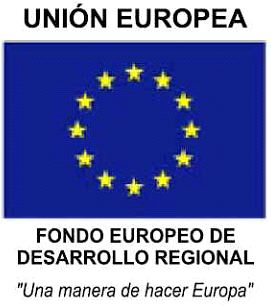
European ITN project FP7-PEOPLE-2012-ITN, PITN-GA-2012-317446-INFIERI
Patentes
“Procedimiento y dispositivo para la detección y discriminación de eventos válidos en detectores de radiación gamma”, Country: Spain, Date: 26/10/2009, Patent numbers: 2327594 B2, P200702836
“Aparato de adquisición de datos para tomografía computerizada por emisión de radiación gamma y su funcionamiento”, Country: Spain, Date:05/02/2010, Patent numbers: 2301303, 200502612
“Aparato de tomografía multimodalidad”, Country: Spain, Date:15/04/2009, Patent numbers: US8,259,899B2, PCT/ES2006/070150, WO 2007/048867 A1, PCT/ES2006/070160 “Multi-Modality Tomography Apparatus”, Country: United States of America, Date:27/08/2009, Patent numbers: WO 2009/127747 A1, PCT/ES2008/000240
“Tomography scanner with axially discontinuous detector array”, Country: United States of America, Date: 31/03/2005, Patent numbers: WO 99/24848, PCT/US98/22875
"Compact modular, configurable base for position sensitive photomultipliers", Country: United States of America, Date: 08/02/2002, Patent numbers: US 6,642,493 B1
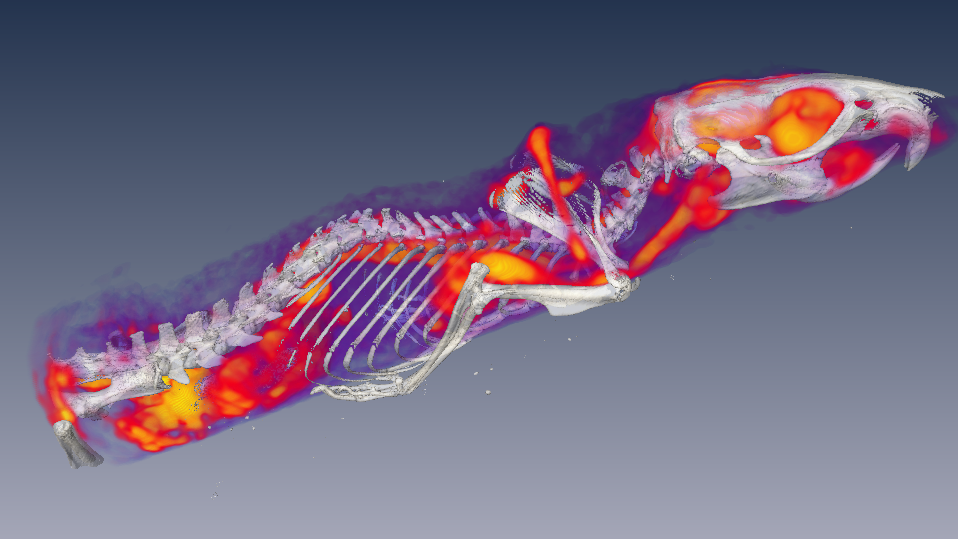
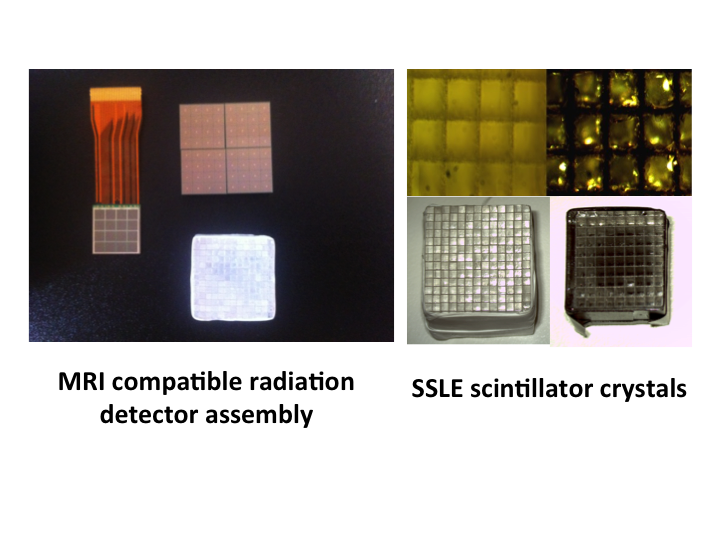
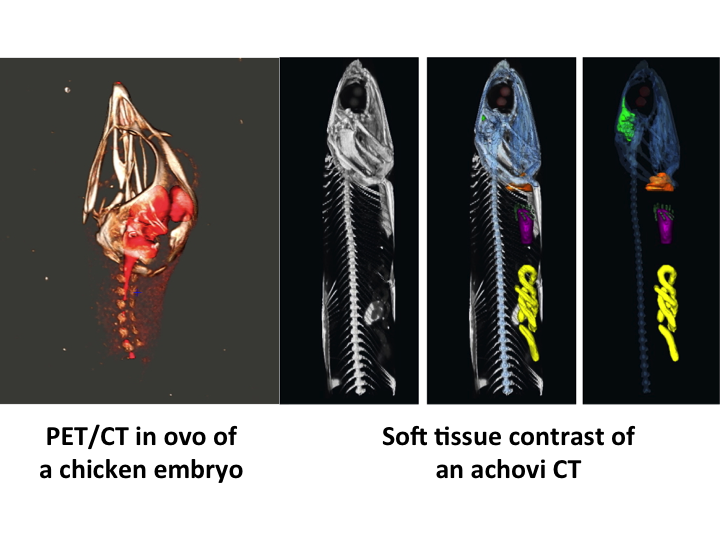
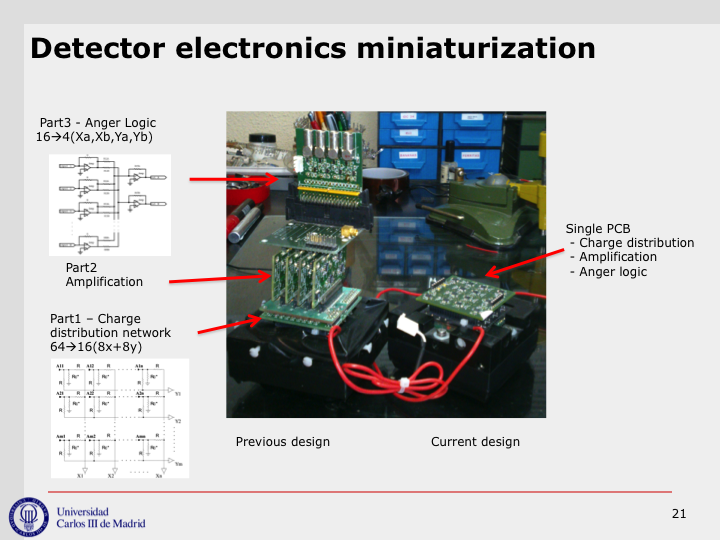
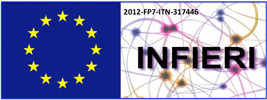



Languages